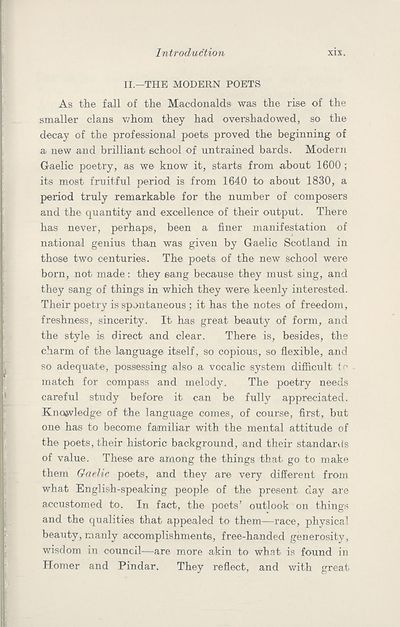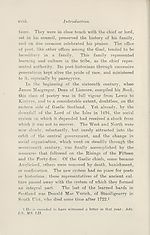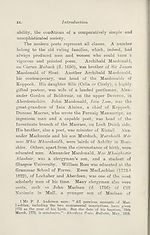Download files
Complete book:
Individual page:
Thumbnail gallery: Grid view | List view

Introduction
II.—THE MODERN POETS
As the fall of the Macdonalds was the rise of the
smaller clans whom they had overshadowed, so the
decay of the professional poets proved the beginning of
a new and brilliant school of untrained bards. Modern
Gaelic poetry, as we know it, starts from about 1600 ;
its most fruitful period is from 1640 to about 1830, a
period truly remarkable for the number of composers
and the quantity and excellence of their output. There
has never, perhaps, been a finer manifestation of
national genius than was given by Gaelic Scotland in
those two centuries. The poets of the new school were
born, not made: they sang because they must sing, and
they sang of things in which they were keenly interested.
Their poetry is spontaneous ; it has the notes of freedom,
freshness, sincerity. It has great beauty of form, and
the style is direct and clear. There is, besides, the
charm of the language itself, so copious, so flexible, and
so adequate, possessing also a vocalic system difficult to
match for compass and melody. The poetry needs
careful study before it can be fully appreciated.
Knosvledge of the language comes, of course, first, but
one has to become familiar with the mental attitude of
the poets, their historic background, and their standards
of value. These are among the things that go to make
them Gaelic poets, and they are very different from
what English-speaking people of the present day are
accustomed to. In fact, the poets’ outlook on things
and the qualities that appealed to them—race, physical
beauty, manly accomplishmente, free-handed generosity,
wisdom in council—are more akin to what is found in
Homer and Pindar. They reflect, and with great
II.—THE MODERN POETS
As the fall of the Macdonalds was the rise of the
smaller clans whom they had overshadowed, so the
decay of the professional poets proved the beginning of
a new and brilliant school of untrained bards. Modern
Gaelic poetry, as we know it, starts from about 1600 ;
its most fruitful period is from 1640 to about 1830, a
period truly remarkable for the number of composers
and the quantity and excellence of their output. There
has never, perhaps, been a finer manifestation of
national genius than was given by Gaelic Scotland in
those two centuries. The poets of the new school were
born, not made: they sang because they must sing, and
they sang of things in which they were keenly interested.
Their poetry is spontaneous ; it has the notes of freedom,
freshness, sincerity. It has great beauty of form, and
the style is direct and clear. There is, besides, the
charm of the language itself, so copious, so flexible, and
so adequate, possessing also a vocalic system difficult to
match for compass and melody. The poetry needs
careful study before it can be fully appreciated.
Knosvledge of the language comes, of course, first, but
one has to become familiar with the mental attitude of
the poets, their historic background, and their standards
of value. These are among the things that go to make
them Gaelic poets, and they are very different from
what English-speaking people of the present day are
accustomed to. In fact, the poets’ outlook on things
and the qualities that appealed to them—race, physical
beauty, manly accomplishmente, free-handed generosity,
wisdom in council—are more akin to what is found in
Homer and Pindar. They reflect, and with great
Set display mode to:
![]() Universal Viewer |
Universal Viewer | ![]() Mirador |
Large image | Transcription
Mirador |
Large image | Transcription
| An Comunn Gàidhealach > An Comunn Gàidhealach Publications > Bàrdachd Ghàidhlig > (23) |
|---|
| Permanent URL | https://digital.nls.uk/126455294 |
|---|
| Description | This contains items published by An Comunn, which are not specifically Mòd-related. It includes journals, annual reports and corporate documents, policy statements, educational resources and published plays and literature. It is arranged alphabetically by title. |
|---|
| Description | A collection of over 400 items published by An Comunn Gàidhealach, the organisation which promotes Gaelic language and culture and organises the Royal National Mòd. Dating from 1891 up to the present day, the collection includes journals and newspapers, annual reports, educational materials, national Mòd programmes, published Mòd literature and music. |
|---|---|
| Additional NLS resources: |
|

